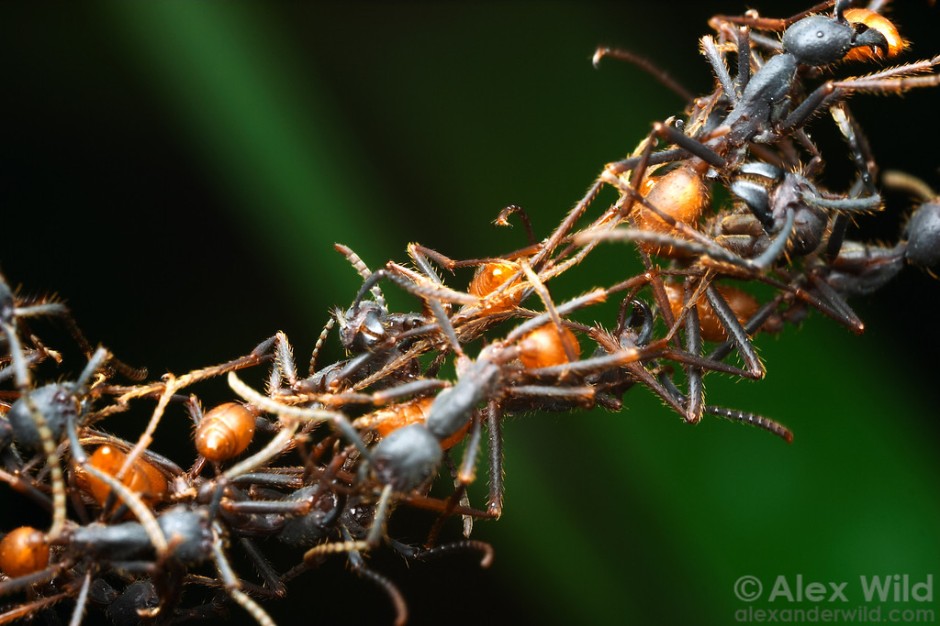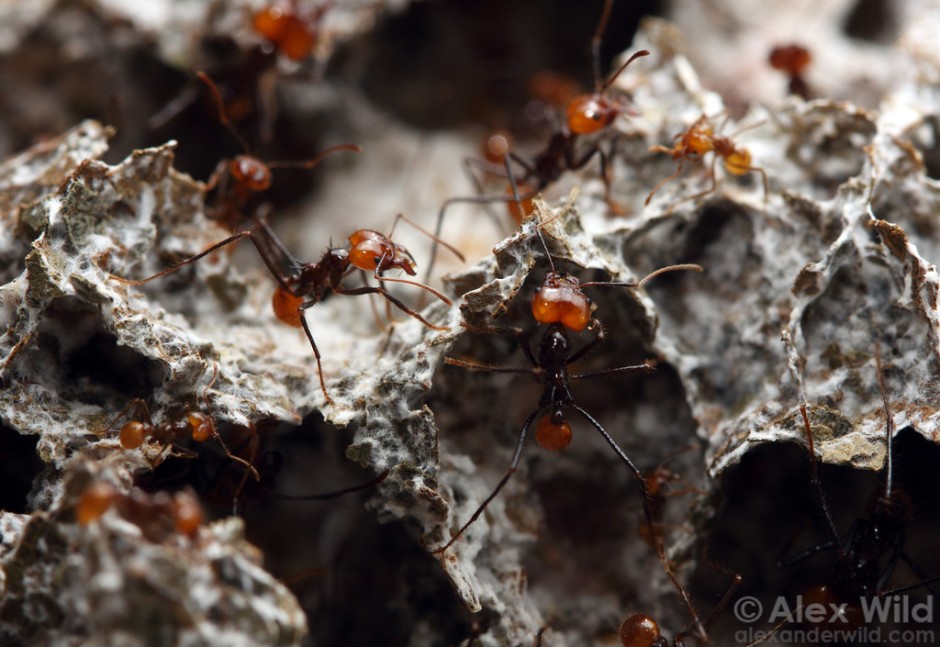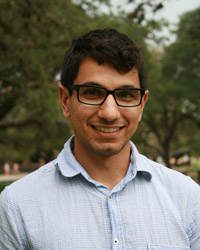The Daily Ant hosts a weekly series, Philosophy Phridays, in which real philosophers share their thoughts at the intersection of ants and philosophy. This is the thirty-fourth contribution in the series, submitted by Dr. Kenny Easwaran.
Mutualistic Anteractions
Individual ants do amazing things. They lift huge objects, bring food to the nest, bite gigantic creatures, sacrifice themselves for others, and lay eggs to start a colony. Ant colonies also do amazing things. They find food at a distance, drive off mammals and poison trees, plan when and where to make new colonies. The behavior of the colony is constituted by the behaviors of the individuals, but are there also cases in which the behavior of an individual is constituted by the behavior of the colony?

I. Of Trash and Ants
On Monday nights I make the trash go away. I do this by taking a bag from our trash can and moving it to a big container that I put by the curb, and on Tuesday the container is empty and I take it back. Very simple.
To put it like this erases the contributions of dozens (thousands?) of other individuals, though. There is a person who drives the truck that comes by on Tuesday morning that collects the contents of the containers. There are the bureaucrats in city hall that wrote the schedule declaring my street to be a Tuesday pickup. There are employees at the landfill, ranging from the laborers who arrange the dumps from various trucks, to the executives setting pay policy, to the secretaries making sure the checks actually get sent. To say that I got rid of the trash hides the contributions of all these individuals to the process.
Even the part of the action that I did most directly, of physically lifting the bag out of the trash can and bringing it down to the container by the curb, depends on the labor of many individuals. It wouldn’t work without the prior efforts of the employees at the factory that manufactured the garbage bag, and the delivery people that brought the bags from an Amazon warehouse to my house, and the advertisers that made me aware of the particular brand of bag. I would have had much more trouble bringing the bag down the stairs were it not for the efforts of people at Bryan Texas Utilities who keep the electricity running so I can see indoors after dark.
However, to declare the taking out of the trash to be a collective action carried out by all these hundreds or thousands of individuals acting together would erase my own distinctive contributions. I took out the trash, and not my partner (who was cleaning the kitchen), or any of the thousands of others involved in the process.
We are perhaps more familiar with the ways in which individuals are assigned (possibly undue) credit for large collective projects. Queen Isabella conquered Granada (some contributions provided by some of the soldiers and generals). Qin Shi Huang built the Great Wall (some lifting rocks done by other people). Zaha Hadid built the London Olympic Aquatics Center (some of the wiring and organization was done by individuals other than her). Pieter Paul Rubens made thousands of huge paintings (some of the backgrounds and animals were painted by his assistants). Ferdinand Magellan sailed around the world. (In the case of Magellan, he didn’t even survive to the end of his voyage.)

But in a modern society, even our ordinary daily actions often contain major contributions made by others. If we want to retain some role for individual agency, we need to consider much of this collective work to be the constitution of a tool that is then manipulated by the agent to whom we want to give credit for the action. I use the city waste disposal service and the municipal electric utility in just the same way that I use the plastic bag and the collection bin. This is not to deny the agency of the individuals that constitute those tools, but just to temporarily bracket it as long as focus is on the person using the tool at the moment.
We can do the same with the ants. We can attribute the raid on your pantry to the scout ant that found the honey. Just as I got rid of the garbage by taking advantage of the work of thousands of others, and Rubens and Magellan did their work by directing other people, that scout emptied the jar by putting a trail of scent for other ants to follow. You might try to say that the particular scout wasn’t essential to the emptying of the honey jar, because some other scout would have found it too. But then again, I wasn’t essential to the emptying the trash can, because my partner would have eventually done it if I had left it too long. Still, I deserve credit for being the one who actually did it, and that scout ant deserves credit too. (In many ways, the accomplishment of this individual scout ant is very much like the accomplishment of Christopher Columbus, who manipulated Isabella into giving him funding to organize hundreds of sailors to lay down a trail someone else would have eventually found, that eventually led all of humanity to mix up the cultural products and species of the entire world while killing and enslaving one another in perhaps the most significant recent extended event for humanity.)
II. Of Ants and Men
While it’s useful to subsume these collective activities into descriptions that foreground the agency of the individual that led it, it can also be useful to do the reverse. My action of taking out the garbage on Monday night wasn’t an entirely individual choice, but was the result of manipulation by others. Whichever city bureaucrat sent around the flyer informing us of the dates of solid waste collection on different streets was in part manipulating me into taking out the trash on Monday night, rather than on Wednesday or Saturday. In the earlier description, I focused on the way my kitchen garbage can got emptied by my action (assisted by the behavior of thousands of other humans as an extended social tool facilitating my action). But we can instead focus on the way the city got its solid waste removed by the organizational capacities of a city bureaucrat (assisted by the behavior of thousands of other humans as an extended social tool, including the behavior of thousands of residents taking out trash bags on particular nights). We could also focus on the way an individual sanitation engineer pays his rent and supports his family by collecting garbage (assisted by the behavior of thousands of other humans as an extended social tool, including the accountants routing service fees from all the city residents to payroll accounts).
Very many of these actions in which an individual uses others as a tool can be reinterpreted with a different agent using a different tool including the original individual. I use the city sanitation service as a tool to clean my house. The city officials use me as a tool to facilitate the convenient removal of garbage. The sanitation engineer uses me and the city as tools to draw a paycheck. The scout ant uses the workers as a tool to collect all the honey from my pantry, but the worker ants use the scout as a tool to find the honey. Michael Pollan, in The Botany of Desire, reinterprets the history of agriculture in this way. Instead of seeing plants as a tool to satisfy the desires of humans, he sees human desires as a tool for the propagation of a few particularly successful plants (apples, tulips, marijuana, and potatoes), which are now much more successful than most wild plants that never learned to manipulate us.

Clearly not every use of others as a tool can be equally well reinterpreted in this reciprocal sense. When one person is enslaved by another, the only use she can make of her exploiter as a tool is by acting in ways that encourage the exploiter to be slightly less cruel in their exploitation. When one person is deceived by another (whether by a lying partner or an advertiser promising impossible miracle cures), she might think she is accomplishing her own desires through the mutual interactions, when in fact she is only accomplishing what the other person wants. And even in cases of free and non-deceptive interaction, one person often has more agency than the other. Emperor Qin and Zaha Hadid had more freedom in their use of laborers than those laborers had in their use of them.
But as long as we, like ants, live in a complex society where most significant actions require the efforts of many individuals and end up affecting the lives of many others, we can’t help but use others as tools, and we can’t help but be used as tools by others. Many people find great value in being employed, or in helping distant others live their lives, even without direct social engagement with the ultimate beneficiaries of their actions.
Some philosophers interpret this manipulation in moralized ways. Some Kantians say that our actions are wrong when they treat others as tools rather than as ends in themselves. Some existentialists say that our actions are inauthentic when we allow them to be manipulated by the desires of others. Each of these critiques would clearly go wrong when applied to the ant that lives by manipulating and being manipulated by the rest of the colony, particularly since the ant can’t even imagine just how many other ants are involved in carrying out their actions.
The same is true of us – we have no idea how many other humans are involved in bringing about the results of our daily actions, and we have no idea how many other humans are taking advantage of the efforts we go through to perform these actions. Hopefully we can change our social organizations to break off the truly exploitative actions. But an ant can’t flourish without living deeply embedded in a network of mutual manipulations, and I suspect a human can’t either. The urgent moral and political questions are not about how to avoid manipulation, but how to fix imbalances that make some of these relations exploitative, and how to avoid interactions that really are harmful to some of the people involved. As long as we must inevitably treat society as a tool, rather than engaging with every single individual on a human level, we should do what we can to make these relations of mutual manipulation enable mutual flourishing.
 Dr. Kenny Easwaran is Associate Professor of Philosophy at Texas A&M University. He got his PhD from the Group in Logic and the Methodology of Science at UC Berkeley, and spent six years as Assistant Professor of Philosophy at the University of Southern California before moving to Texas. His work is primarily in formal epistemology and decision theory. Much of it has focused on issues around the role of infinity in various puzzle cases, but he has also done work on the connection between probability and belief, and on the role of probability in mathematical reasoning. Some of his current projects involve investigating how probability and decision theory can be used to understand the behavior of collectives over time, rather than just individuals at a moment.
Dr. Kenny Easwaran is Associate Professor of Philosophy at Texas A&M University. He got his PhD from the Group in Logic and the Methodology of Science at UC Berkeley, and spent six years as Assistant Professor of Philosophy at the University of Southern California before moving to Texas. His work is primarily in formal epistemology and decision theory. Much of it has focused on issues around the role of infinity in various puzzle cases, but he has also done work on the connection between probability and belief, and on the role of probability in mathematical reasoning. Some of his current projects involve investigating how probability and decision theory can be used to understand the behavior of collectives over time, rather than just individuals at a moment.